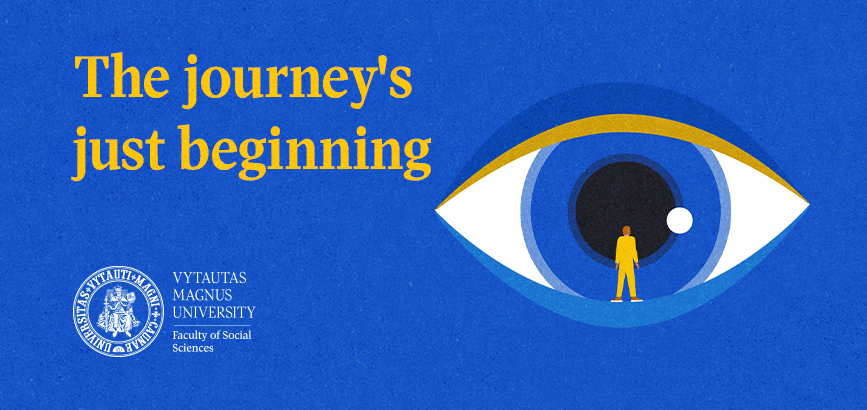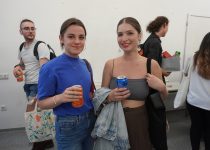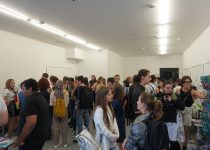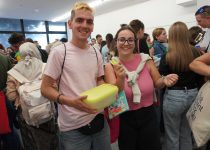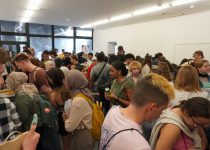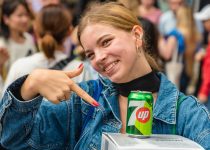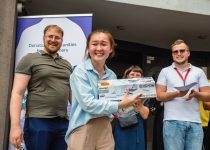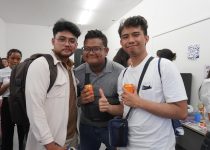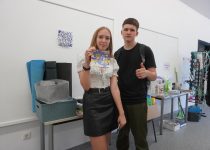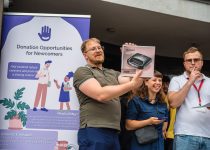SMF wishes you happy holidays!
Apply now: Erasmus+ Traineeship Competition
A competition is open for Erasmus+ student and recent graduate traineeship grants. The application deadline is the 30th of November, 2023.
The placement period is from 2 to 6 months.
Selection
All VMU full-time degree students who have not used more than 10 months of their Erasmus mobility (study / traineeship) period are eligible for the Erasmus grant.
Selection documents
For student traineeship (traineeship during student’s year of studies)
- Filled-in application form „Outgoing-Application for Erasmus Student Traineeship (EU countries)“
- Confirmation by the company or organization (obligatory).
For recent graduate traineeship (application must be submitted during the last year of studies)
- Application form „Outgoing-Application for Erasmus Recent Graduate Traineeship (EU countries)“
- Confirmation by the company or organization (obligatory)
- Recommendation by a faculty member (obligatory)
The priority in the selection is given to
- students whom traineeship is an obligatory part of their study programme;
- students who have never been Erasmus traineeship students before.
Selection criteria
- student’s motivation;
- good knowledge of the language which will be used during the traineeship;
- student’s work, study, traineeship, participation in the international / academic projects, social activities experience in Lithuania and abroad;
- conformability between the chosen traineeship and student’s study programme;
- study results (first year MA students should attach transcript of records of their BA/MA degree to the application form).
The competition results will be sent to every participant via e-mail.
Competitions for Erasmus+ traineeships are taking place each month.
Exclusive Opportunity for Exchange Studies in non EU/EEA Countries
VMU students are invited to participate in a competition for exchange studies in spring semester, 2024 in non-EU/EEA countries with Erasmus+ scholarship.
Application deadline – November 3rd, 2023.
VMU offers one semester studies in one of the regions:
For more information please contact VMU ICD coordinators Eglė Daukilaitė (egle.daukilaite@vdu.lt) and Raimundas Rukuiža (raimundas.rukuiža@vdu.lt).
Prof. Adam Kuper to Hold a Public Lecture and Seminar at VMU
On Thursday, 19 October, at 16:00, Adam Kuper, Professor at the Department of Anthropology at the London School of Economics and Political Science will hold a public lecture and seminar “From the Museum of Other People to the Cosmopolitan Museum”. The lecture will take place at Vytautas Magnus University, Faculty of Social Sciences (Jonavos str. 66 Kaunas, room 323).
Museums of Other People put on display an exotic world of ‘primitive’ or ‘tribal’ peoples who lived far away or long ago. Today these museums are charged with propagating colonialist, even racist, attitudes, with cultural appropriation, and even with outright robbery. In their place come Identity Museums, or museums of ‘Tribal Art’. Could we imagine a cosmopolitan museum that transcends local, or ethnic or national identities, tracks exchanges across political frontiers, brings out connections, makes comparisons?
Adam Kuper is the Professor at the Department of Anthropology at the London School of Economics and Political Science, a Visiting Professor at Boston University, and a recipient of the Huxley Medal of the Royal Anthropological Institute. He has authored or edited 19 books and published over 100 journal articles.
Organizer: The Center of Social Anthropology at Vytautas Magnus University.
Erasmus+ Traineeship Competition
A competition is open for Erasmus+ student or recent graduate traineeship grants for traineeships in any country of the world. Application deadline is the 31st of October, 2023.
The placement period is from 2 to 6 months. Recent graduate traineeship must end – in a year after graduation.
Selection
All VMU full-time degree students who have not used more than 10 months of their Erasmus mobility (study/traineeship) period are eligible for the Erasmus grant.
Selection documents
For student traineeship (traineeship during student’s year of studies):
- Filled-in application form „Outgoing-Application for Erasmus Student Traineeship“
- Confirmation by the company or organization (obligatory).
Documents must be submitted online.
For recent graduate traineeship (application must be submitted during the last year of studies):
- Application form „Outgoing-Application for Erasmus Recent Graduate Traineeship “
- Confirmation by the company or organization (obligatory);
- Recommendation by a faculty member (obligatory).
The priority in the selection is given to:
- students whom traineeship is an obligatory part of their study programme;
- students who have never been Erasmus traineeship students before.
Selection criteria:
- student’s motivation;
- good knowledge of the language which will be used during the traineeship;
- student’s work, study, traineeship, participation in the international/academic projects, social activities experience in Lithuania and abroad;
- conformability between the chosen traineeship and student’s study programme;
- study results (first year MA students should attach transcript of records of their BA/MA degree to the application form).
Traineeship grants:
For EU and EEA countries:
| Country group | Country | Monthly scholarship size |
| Group I | Denmark, Finland, Iceland, Ireland, Luxembourg, Sweden, United Kingdom, Liechtenstein, Norway | 750,00 Eur |
| Group II | Austria, Belgium, ,Germany, France, Italy, Greece, Spain, Cyprus, Netherlands, Malta, Portugal | 750,00 Eur |
| Group III | Bulgaria, Croatia, Czech Republic, Estonia, Latvia, Lithuania, Hungary, Poland, Romania, Serbia, Slovakia, Slovenia, North Macedonia, Turkey | 690,00 Eur |
| Group IV | Switzerland | 700,00 Eur |
For Non-EU/EEA countries:
Scholarship is 700,00 Eur/month.
Travel grant (depends on the distance between sending and receiving institutions):
- 100-499 km – 180,00 Eur
- 500-1999 km – 275,00 Eur
- 2000-2999 km – 360,00 Eur
- 3000-3999 km – 530,00 Eur
- 4000-7999 km – 820,00 Eur
- More than 8000 km – 1500,00 Eur
Additional travel grants for green travelling options.
The competition results will be sent to every participant via e-mail.
More information:
DON@: International Students Embrace “Sharing is Caring” Event
On August 24th, Vytautas Magnus University (VMU) hosted “Sharing is Caring” Donation Day for the first time, a heartfelt event that brought together newcomers and international students to embrace the spirit of giving back.
During the event, almost 100 exchange and full-time students were invited to find kitchen essentials, items for cleaning, and things for studies and sports to start their new academic year and study journey in Kaunas.
The event was organized as part of the DON@ Donation Opportunities for Newcomers project aimed to facilitate the integration and improvement of living conditions of students with fewer opportunities by promoting mutual support, inclusion, and sustainable development. We extend our gratitude to the Student Affairs Department, the Baltija Dormitory administration, and our dedicated volunteers for their invaluable support in organizing this event.
Rocco, an exchange student from Italy: “Thanks to the DON@ event, I managed to get a kitchen kit, which will be helpful for me. And during the event, I also managed to get this ladle to cook some sauce for my pasta. Thank you so much!”
Mariia, a full-time student from Ukraine: “I think it’s a really good project that saves our planet and our environmental system. Also, we don’t overuse new products, we don’t buy the items and new things”.
Yana, an exchange student from Ukraine: “I’ve joined this event, and I’ve got a wooden cutting board so that all tables will be saved now. Thank you for this event and for the donations!”
Also, all registered students could win unique electronic things left by previous students via lottery, such as a sandwich maker, garment steamer, hand blender and smoothie maker kit, and electric lint remover for clothes.
The “Sharing is Caring” event within the Orientation Day’s programme was not only for sharing things but also offered a unique opportunity for new international students to connect, share experiences, and make friends.
Anastasiia, a full-time student from Ukraine: “We are very glad to be a part of this donation event because it’s a great opportunity to make new connections, to meet more people, and to get some devices for free which we will really use!”
The “Sharing is Caring” Event was made possible by the donations of the previous cohort of exchange students, recent graduates, and volunteers. At the end of last semester, 35 students left gently used or new things they no longer needed (kitchen stuff, electronics, items for cleaning, hobbies, and studies).
Many VMU students expressed their wish to help with the project implementation at the end of the previous academic year.
Shaurya, a full-time student from India, shares his impressions: “I decided to help the DON@ team in their item collection from departing students. The events were set to coincide with the students leaving after finishing the semester to ensure maximum collection and minimum waste generation. I helped the team during their collection events in Baltija dormitory, where different students came forward and donated their stuff for the future students”.
Roman, a full-time student from Azerbaijan, joined a volunteer team too: “I volunteered for the DON@ project that promotes sustainable development as it saves stuff and passes to the next generation from the previous students. It helps with plastic emissions, reduces waste, and helps students with fewer opportunities. They don’t need to go and buy the stuff; they arrive and get it. I was very glad to participate in this project and remember caring”.
Moreover, many items left by foreign students (clothes, footwear, bedding) were donated to people experiencing homelessness at the Kaunas Archidiocese Caritas (Ateik Caritas).
Quote from Day center manager Rosita Mikėnienė, who accepted donated items:
“Ateik” day center at the Kaunas Archdiocese Caritas is for people experiencing homelessness and loneliness to spend time, warm up, drink a cup of coffee or tea, and be in a safe environment. About 30-40 people visit here daily, even more in winter. Most of them receive very little or no income, so they need various assistance in the form of clothes, food, and other items. Thanks to the students for their help and this donation initiative.”
Study Exchange and Internship Opportunities for Students
International Cooperation Department invites all VMU students to take an opportunity and apply for studies, traineeship or short-term courses abroad.
These are enriching possibilities that strengthen self-improvement while expanding study knowledge and skills of foreign languages, facing the differences in the study systems, improving professional skills, exploring new cultures, finding new interests, making new friends and bringing unforgettable memories that build the foundation for the future career.
We offer four different options for international mobility:
- Erasmus+ studies (in EU/EEA countries). Submit your applications by 2 October 2023.
- VMU bilateral exchange and Erasmus+ studies (in non-EU/EEA countries). Submit your applications by 2 October 2023.
- Erasmus+ student and recent graduate traineeships (in EU/EEA countries). Submit your applications by the end of each month.
- Short-term courses abroad. Submit your applications by 15th day of each month.
On September 19–21, VMU International Cooperation Department will organise Erasmus Days’23 where all students will be invited to learn more about mobility opportunities and join various interesting and meaningful initiatives.
More information about Erasmus Days
New Academic Year with Kaunas Universities
Vytautas Magnus University will greet the new academic year together with Kaunas University of Technology, Lithuanian University of Health Sciences and Lithuanian Sports University. On September 1st, Friday, you are welcome to attend joint festive events.
This year, the event will start at 12 p.m. with Holy Mass at the Kaunas Cathedral Basilica of the Apostles St. Peter and Paul (Vilniaus g. 1), followed by a joint oath-taking ceremony in the courtyard of the Historical Presidential Palace of the Republic of Lithuania (Vilniaus str. 33) at 2 p.m.
Later, the students will march towards Independence Square, led by the KTU brass band The BrassBees. The main event of the celebration will take place here and will be crowned by a festive concert featuring the joint university choir and the singer GJan. At 3.30 p.m., VMU community is invited to enjoy a glass of wine in the lobby of the Great Hall.
Detailed program of the celebration:
- 12 p.m. Holy Mass at the Kaunas Cathedral Basilica of the Apostles St. Peter and Paul (Vilniaus g. 1)
- 2 p.m. Participants of the festive procession gather in the courtyard of the Historical Presidential Palace of the Republic of Lithuania (Vilniaus g. 33)
- 2–2.15 p.m. Students’ speech/oath.
- 2.15 p.m. Procession of the universities’ community (we depart from the courtyard of the Historical Presidential Palace, walking down Laisvės Alėja to Nepriklausomybės Square).
- 3 p.m. Festive concert at Nepriklausomybės Square featuring the joint choir of the universities and GJan!
- At 3.30 p.m., VMU community is invited to enjoy a glass of wine in the lobby of the Great Hall (S. Daukanto g. 28)
The event will be photographed and/or filmed; therefore, please note that you might be featured in photos or videos which can be published in various media.
Student Registration into Study Subjects for Autumn Semester 2023
The first stage of the autumn semester 2023/2024 registration for lectures, seminars and laboratory works is on 25-29 August. At this stage, the registration is open:
- For full-time and part-time students of bachelor and integrated studies (excluding 1st year students)
- For full-time and part-time students of master studies
- For full-time students of professional studies
- For part-time free-movers
- For part-time exchange students
Registration of first-year undergraduate and full-time students will take place on 31 August.
Enrolment will be performed online only, having connected to VMU Students’ Self-service Portal at: https://studentas.vdu.lt.
A username is: name.surname (lowercase, Latin alphabet letters only) and a password.
If a student has forgotten the password, he/she can set up a new one at the site: https://support.vdu.lt/. Instructions are available here.
Barakat Smoqi: My Exciting University Experience
nuotraukoje greta Barakato – VDU Socialinio darbo katedros profesorius Jonas Ruškus
While in Iraq, I was always searching for an opportunity to pursue a master’s degree in social work outside my country. I had a particular interest in Lithuanian universities due to their significant number of international students. One night in a displacement camp, as I was browsing Facebook, I came across a post announcing a vacant position to study a master’s degree in Social Work at VDU University. Without hesitation, I immediately filled out the application form. VDU had been my dream destination, and I was ready to seize this valuable opportunity.
After about a month had passed, I received an email congratulating me on my acceptance to VDU University. It was an indescribable moment of joy. I felt overwhelming happiness as if I were about to fulfill my dream. However, the road to reaching the university was not easy. I traveled to Turkey for an interview to obtain a Lithuanian visa since there is no Lithuanian embassy in Iraq. Unfortunately, my initial application was rejected. I felt a great sense of disappointment as I had left two jobs behind in Iraq and depleted my savings for this aspiration. But thanks to the university’s support and cooperation, they extended the attendance and document submission deadline, which helped me in attempting to reapply for the visa. After another 35 days, I finally obtained the visa.
Now, let me share a little about my experience at the university. Today, it has been almost fifteen days since I graduated from the university, obtaining a master’s degree in social work. Despite the remarkable academic system and organization, what truly enriched my experience was the kind and immensely helpful university community.
While at the university, I felt as if I were living among my family members. They greatly assisted me in facing the challenges I encountered and played a significant role in my personal and professional development. In fact, I felt such strong support that I unintentionally referred to it as “my university” in my defense letter instead of its actual name. For this reason, I am indebted to this university and feel deep gratitude towards it.
Based on my personal experience, I highly recommend this esteemed university, especially the Department of Social Work, to anyone seeking an excellent educational system and a strong academic background. The university provides exceptional education that meets the needs of the modern job market, and personally, I have benefited greatly in developing my practical skills and critical thinking.
Aside from the high-quality education, the university’s community is what really sets it apart. The social experience there was great, interacting with students of different nationalities and friendly and helpful faculty. They were always willing to help me in any way they could. It’s a really friendly university.




